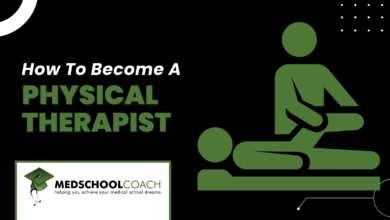Want to impress during your residency program? Follow these residency rotation tips from MedSchoolCoach Physician Advisor, Blair Nelson, M.D.
Residency is the long hallway that connects classroom learning to practicing medicine. It comes with a lot of written rules and papers to sign. But it also comes with a lot of unwritten rules.
Here are some actionable clinical rotation tips to help you prepare for and stand out during your residency. Consider it the residency consulting I wish I’d had some 20 odd years ago. You can thank me later.
My Personal Residency Experience
It was a warm May morning in 1996 as I paid the $6 parking lot fee. I was merely a mile away from the Hennepin County Medical Center Emergency Department. “Long Day” by Matchbox 20 blared from my crackly car speakers. I walked briskly along the mile trek to be on time for my first day of my ER rotation that I had been eagerly anticipating for many months.
I had an intense desire to make a good impression on the attending staff and senior residents because this residency program was considered one of the best in the nation. I’d soon be preparing my ERAS application for this specialty.
As I entered the chaotic dyn of the Emergency Department, I felt horribly unprepared. Was I suddenly stripped of my clothing and only wearing my undergarments? Had I washed said undergarments anytime recently? Did anyone have a clue what I was supposed to do next?
I wish I had someone to tell me what to do. Some residency rotation tips would’ve been helpful…
Things Have Changed Since the 90s
Does “pimping” still mean that your attending physician or senior resident just put you on the spot with a question? Back in the mid-90’s when I was a medical student (and we used stone tablets with chizzles to document progress notes), that was the term used.
So today’s pimping question is, “What time do you show up on the first day of your sub-internship rotation? Specifically, what time to impress the top program of your choice?” I’ll be generous with a multiple choice format:
A) 8:00 AM Central Daylight Time
B) Noon
C) Depends upon what time the intern arrives
D) None of the above
E) All of the above
F) D and E
G) I am quitting to apply to law school
This question sounds silly, but is actually more important than it seems. If you are still unsure of the answer, it is C – you should plan to arrive when the intern arrives.
This segues nicely into my first category of residency rotation tips.
Be prepared before the rotation begins.
Residency Rotation Tips for Preparation
Preparation for your upcoming rotation should begin at least a week or two in advance.
The following areas should be covered:
Knowledge Preparation
This should be the first area of focus. There are multiple resources available to help you.
Clerkship rotation study guides
They’re small, easy to carry, and are available for your smartphone.
Textbooks covering rotation material
Tintinalli’s ER textbook is a great resource. However, it’s an aggressive textbook that would take months of diligent time to read. These are intended for reference in areas where you want more information. For example, you might need information regarding specific patients or for a topic-specific presentation.
While the web is rife with online resources, be careful. Not everything is of the same quality and validity. While exercising caution, you can try:
- Google searches
- Audio downloads
- Ask Siri or Alexa, “Give me a rundown on acute coronary syndrome medications.”
- Ask students who just finished this rotation. They’ve been pimped already.
Logistical Preparation
Logistical preparation should be done the week prior to the start of your rotation.
You’ll want to know the following:
Where to park
And if there’s a free alternative. For example, you could take the bus or ride your bike.
Where to report on your first day
Very politely ask your rotation coordinator. You want to be nice to these folks because they can make your life nice or a downright living nightmare.
What time to report on your first day
You may want to query students who have completed this rotation. Why? There’s a difference between the written and unwritten expectations. The idea is to be a step ahead.
For example: The student manual said to arrive at 8 a.m. But the real world expectation was to arrive at 6 a.m. to pre-round with the intern/junior residents.
If there is an expectation to take overnight calls
Ask the intern/resident to whom you directly report. You might not be able to find this out until the first day of your rotation. Pack a toothbrush, any medications you take, clean undergarments, pajamas, and an extra outfit – just in case.
If there is time to eat in the cafeteria
Should you bring some compact nutrients? Nothing loses points faster than a student asking if they can leave a surgical case or trauma resuscitation to get food. Ask the students who just completed this rotation.
Where the most convenient bathrooms are located
Ask the nurses. Again, be extra nice to these folks as they can make your life even more of a horror movie.
What attire you should wear
Scrubs? Casual? Semi-formal? Formal? Don’t show up dressed to the nines. You’ll feel awkward and out of place.
Now you’re prepared for your rotation. Good for you! It is now 6:03 a.m. You arrive at the hospital and find the junior resident who’s in charge. Now what? Become useful. Don’t add work to the already overstretched residents/interns.
More Residency Rotation Tips to Impress
Make A Good First Impression
Introduce yourself quickly (don’t share your entire resume), and ask what you can do to make their workload lighter. This will immediately score you some points.
Some other ways to look like a rock star and help you make a good impression during your rotation?
Look For Ways To Make Everyone’s Life Better and Easier
This includes patients, residents, and interns alike. Don’t be arrogant or narcissistic. Humility will get you far. Offer to get a resident lunch. Get a patient a fresh cup of water. Small, everyday tasks can make a big difference.
Find Information Without Asking Anyone
You’ll find the people who enjoy teaching you more than you can process. Learn on your own the rest of the time, instead of stressing out the busy resident. (This doesn’t mean attempting to complete a task you don’t know how to do. This refers to more general information.)
Prepare Like You Would for Your Residency Applications
Hopefully you got help with your residency applications. Prepare for the next day or the next task at hand the same way. Read up on the procedure for the bowel resection you’re scrubbing in for tomorrow. Understand the procedure and complications. If you get pimped, you’ll look like a genius.
Think Ahead & Be Proactive
Try to anticipate what needs to be done. If you have the capabilities and knowledge, go do it. Just don’t do anything out of your scope of duties. “I took the staples out of the abdominal incision we placed in surgery yesterday.” Yeah, don’t do that.
Don’t Get in the Way
This sounds simple and common-sense, but can be crucial. It is exciting and exhilarating to experience some of these new procedures or emergency conditions, but there are those that need to get their tasks completed in order for the best patient outcome. Sacrifice your “view” and find out if you can be of help (taking notes, retrieving supplies, etc.).
Be Extra Helpful
Offer to train the next group who will come in. “Want me to show the new nursing student where the cafeteria is located?” Or, just do it without asking.
Don’t leave if there is still work to do. You should be one of the last to leave for the day. Make sure to ask if anything else needs done before you leave, and know when to return the next day. Ask if there is anything to prepare for the following day/week.
Attitude Matters
Stay positive and energetic. Complaining about fatigue or how much something may be unpleasant only adds to the negativity. Your enthusiasm can be infectious, elevating the energy of the whole team.
When it’s appropriate to the situation, ask for feedback from your junior resident, senior resident, attending, and nursing staff. The administrative world expects mid-rotation and end-of-rotation feedback. However, this rarely occurs in a formal setting. If you want feedback, ask for it whenever the situation calls for it.
Be kind and respectful to every part of the team. Being rude to nurses, techs, unit coordinators will get back to whomever is in charge of grading you. This should be a universal quality in any healthcare professional. If someone is rude to you, don’t get all bent out of shape. If it becomes inappropriate, find out who to report the situation to.
Conclusion
Your residency rotation will be inherently stressful, but it should also be incredibly rewarding. Being prepared and knowing the best way to handle yourself will take you far.
MedSchoolCoach is Here to Help
Fortunately, it is no longer 1996 (even though I am still a big fan of Matchbox 20), and there is residency advising through MedSchoolCoach. Physician Advisors, like myself, offer personal services to help you on your medical school journey, from start to finish. Our residency consulting services includes:
- Residency application guidance
- Residency program selection
- Writing advisors for residency personal statement
- Interview preparation
- And much more
You can schedule a free consultation for residency advising to see if it’s right for you.
It seems fitting to leave you with a quote from the song I referenced at the beginning of this article. In their song “Long Day”, Matchbox 20 sings: “reach down a hand in your pocket; pull out some hope for me; it’s been a lonnnnng day.”



